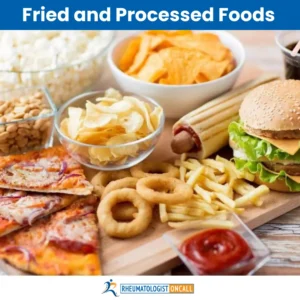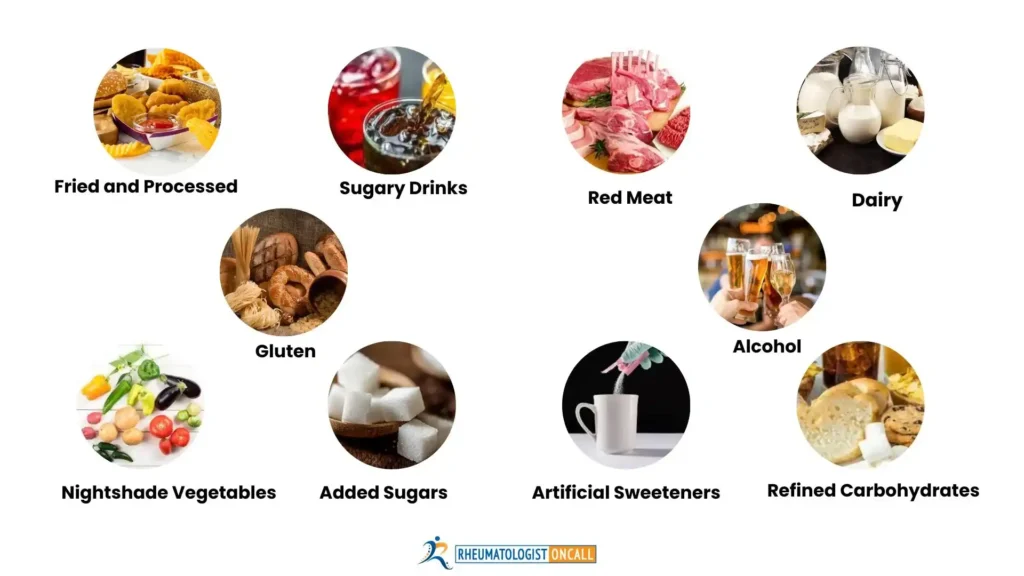SHARE
Living with Rheumatoid Arthritis (RA) poses many challenges, from painful joint swelling to exhausting fatigue, dry eyes, and dry mouth. This autoimmune condition causes the immune system to mistakenly attack healthy tissue in the joints and other organs in the body, leading to inflammation and damage.
Could your diet be worsening rheumatoid arthritis inflammation?
Research shows certain foods appear to trigger inflammatory responses in those with Rheumatoid Arthritis (RA). By removing these “trigger foods” and choosing anti-inflammatory alternatives, you may be able to reduce joint pain and swelling significantly.
In this article, we’ll dive into the top 10 foods rheumatoid arthritis patients should avoid, along with gut-healthy replacements. We’ll also explore the connection between diet, gut health, and autoimmune disease.
Understanding the Gut-Joint Connection in Rheumatoid Arthritis
Rheumatoid Arthritis (RA) results from a dysfunctional immune system attacking the synovial membrane lining the joints. This leads to swelling, stiffness, and eventually cartilage and bone erosion.
While the exact cause remains unknown, experts believe the gastrointestinal (GI) tract plays an important role. Here’s why:
- About 70% of immune system cells reside in the gastrointestinal (GI) tract.
- Intestinal permeability (“leaky gut”) allows toxins, bacteria, and undigested food particles to enter the bloodstream, triggering widespread inflammation.
- Certain foods contain lectins, a plant protein that may bind to tissues and promote inflammation, especially in those with a genetic predisposition.
By removing gut-aggravating foods and choosing real, whole-food alternatives, Rheumatoid Arthritis (RA) patients may be able to calm their immune systems and reduce systemic inflammation.
Let’s look at the top 10 foods to limit or avoid.
1. Fried and Processed Foods

Fried foods like french fries, chicken nuggets, and potato chips contain high amounts of saturated and trans fats. These unhealthy fats drive oxidative stress and inflammation.
Processed foods are loaded with refined carbohydrates, added sugars, and added salt, lacking fiber that supports healthy gut barrier function.
What to eat instead:
- Bake, broil, grill, roast, sauté or air-fry proteins and veggies
- Try new seasonings like rosemary, thyme, oregano, paprika, curry
- Make veggie kebabs, salmon cakes, stuffed peppers
2. Sugary Drinks
Sodas, fruit juices, sweet tea, sports drinks, and coffeehouse beverages contain added sugar with no beneficial nutrition. Studies show these drinks’ high fructose corn syrup promotes an inflammatory response. Consuming just one soda daily increases the risk of developing Rheumatoid Arthritis (RA).
Choose water or herbal tea, or make fruit or herb-infused water at home. The antioxidants in berries, citrus, mint, basil, and melons support healthy inflammation levels.
3. Red Meat
Red meat high in saturated fat may cause inflammation when eaten in excess. Cooking meat at high temperatures also creates harmful compounds (AGEs) that trigger inflammatory cytokines.
Limit red meat to 1-2 times per week by incorporating more plant-based proteins like beans, lentils, nuts, seeds, and tofu. When you do eat meat, choose leaner cuts of grass-fed beef.
4. Dairy
Many people may have difficulty digesting milk due to lactose intolerance. For Rheumatoid Arthritis (RA) patients, dairy may also contain proteins that trigger inflammation, leaky gut, and autoimmune reactions.
Eliminate dairy for four weeks and monitor symptoms. Substitute nut or coconut milk for smoothies. Try coconut yogurt with fruit or non-dairy cheese.
Kefir and plain Greek yogurt contain beneficial probiotics.
5. Gluten
Roughly 20-30% of those with Rheumatoid Arthritis (RA) react negatively to gluten. Gluten found in wheat, rye, and barley may increase intestinal permeability and immune activation in those with non-celiac gluten sensitivity.
Test a 100% gluten-free diet for at least three to four months.
Replace gluten-containing grains with gluten-free options like brown rice, quinoa, buckwheat, and certified gluten-free oats.
6. Nightshade Vegetables
Tomatoes, white potatoes, eggplants, and peppers contain alkaloids called solanine and capsaicin that may trigger joint pain and inflammation in sensitive individuals.
Cut out nightshades for 3-4 weeks and observe symptom changes. Substitute with colorful, non-nightshade veggies like broccoli, cauliflower, carrots, beets, mushrooms, and butternut squash.
7. Refined Carbohydrates
Refined grains like white bread, crackers, pastries, and baked goods quickly spike blood sugar levels. The resulting insulin surge promotes inflammation. Refined carbs also lack gut-supporting fiber.
Choose 100% whole grain options like sprouted bread, brown rice pasta, quinoa, steel-cut oats, and millet. They digest slowly to provide steady energy and nourish healthy gut flora.
8. Alcohol
Alcohol may increase inflammation in the body and worsen the symptoms of Rheumatoid Arthritis (RA). Some studies support drinking a glass of red wine, but it doesn’t have to be more than one glass and not every day. If you take medications such as Methotrexate or leflunomide that gets metabolized through the liver, drinking alcohol is contraindicated.
Try replacing alcohol with non-alcoholic beverages such as sparkling water with a splash of juice or herbal teas. If you choose to drink alcohol, discussing your choice with the rheumatologist and having them follow up properly with labs to evaluate your liver and kidney is recommended.
9. Added Sugars
Added sugars hide everywhere – condiments, cereals, sauces, yogurt, etc. Extra sweeteners like high fructose corn syrup, agave, and cane sugar dramatically spike blood glucose and inflammatory cytokines. They also feed bad gut bacteria.
Check food labels and avoid anything with added sugars, especially unhealthy sweeteners. Satisfy sweet cravings with fresh fruit, small squares of dark chocolate, maple syrup, or raw honey.
10. Artificial Sweeteners
Artificial sweeteners like aspartame, saccharin, and sucralose may disrupt healthy gut flora balance and increase intestinal inflammation.
Avoid chemical sweeteners in diet soda, light yogurt, sugar-free desserts, and more. Satisfy your sweet tooth with fruit.
Filling Your Plate with Anti-Inflammatory Foods
While eliminating food triggers is crucial, including abundant gut-healing, anti-inflammatory foods in your diet is just as important. Focus on eating more of the following:
- Colorful Fruits and Vegetables: Provide antioxidants like vitamin C, beta-carotene, and lycopene to combat inflammation
- Leafy Greens: Rich in vitamins A, K, C, magnesium, and folate. Feed good gut flora.
- Healthy Fats: Cold-water fish, avocados, olive oil, nuts, and seeds. Omega-3s resolve inflammation.
- Fermented Foods: Sauerkraut, kimchi, kefir, and yogurt contain probiotics for optimal gut health.
- Herbs & Spices: Turmeric, ginger, and garlic have powerful medicinal compounds.
- Green Tea: Polyphenols reduce inflammatory immune reactions.
The Takeaway: Diet Matters for Controlling Rheumatoid Arthritis
Reducing the intake of common trigger foods while emphasizing gut-healing nutrition can make a big difference. An anti-inflammatory protocol may calm overactive immune responses and ease painful symptoms by supporting healthy gut barrier function and microbiome diversity. Although dietary changes alone cannot cure Rheumatoid Arthritis, they can significantly improve quality of life when part of a comprehensive treatment plan. If you need help managing rheumatoid arthritis through dietary changes, contact Rheumatologist OnCall. We provide specialized care tailored to your unique needs. We’ll give you the tools to take control of your health. Visit our website or call today to learn more!














